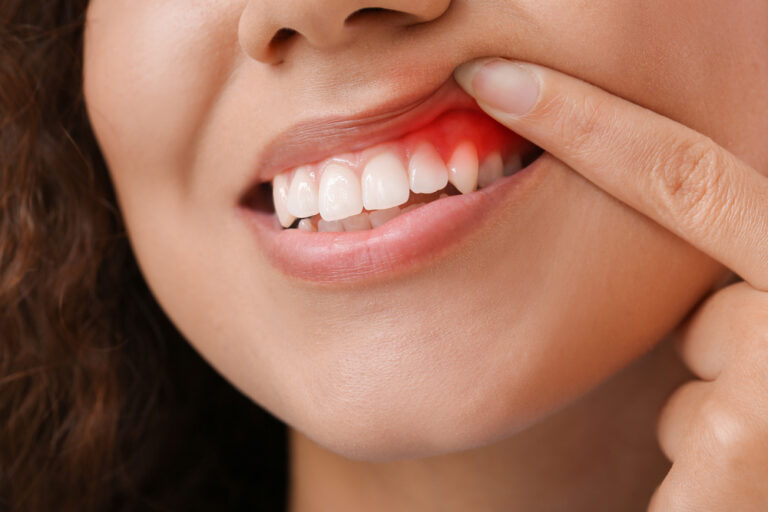Gum disease, also known as periodontal disease, is a common condition that affects the tissues surrounding the teeth. Understanding the factors that contribute to its development is crucial for maintaining optimal oral health.
From poor oral hygiene habits to genetic predispositions, various elements play a role in the onset of gum disease.
However, the battle against this condition is not lost. By implementing certain strategies and making lifestyle adjustments, individuals can effectively combat gum disease and safeguard their dental well-being.
Importance of Oral Hygiene
What role does maintaining good oral hygiene play in preventing gum disease?
Oral health is crucial in preventing periodontal disease, commonly known as gum disease. Regular brushing and flossing help remove plaque buildup, a major cause of gum disease. Neglecting oral hygiene habits can lead to gingivitis symptoms like red, swollen gums and bleeding.
Proper dental care, including routine dental cleanings, is essential to combat gum disease. Professional cleanings remove tartar buildup that regular brushing may miss, preventing the progression of gum disease.
Being aware of signs of gum disease, such as persistent bad breath, receding gums, and loose teeth, can prompt early intervention and treatment, emphasizing the importance of maintaining good oral hygiene practices.
Impact of Smoking on Gums
Smoking significantly exacerbates the risk and severity of gum disease by compromising oral health through detrimental effects on gum tissues and overall immune response. Tobacco use not only increases the likelihood of developing periodontal disease but also hinders the body’s ability to fight off infections, leading to persistent gum inflammation and a higher incidence of gingivitis.
The impact of smoking on gums underscores the importance of prioritizing dental care and seeking smoking cessation support to mitigate these harmful effects. By quitting smoking and adopting a proactive approach to oral hygiene, individuals can take significant steps towards improving their gum health and overall well-being.
Role of Diet in Gum Health
A balanced and nutritious diet plays a crucial role in maintaining optimal gum health and preventing the onset of gum disease. The foods we consume directly impact our dental health by affecting the development of gum disease bacteria, plaque buildup, and periodontal pockets.
A diet rich in vitamins, minerals, and antioxidants promotes gum health, while a diet high in sugars and processed foods can contribute to gum disease. Proper nutrition supports the integrity of the gumline, reducing the risk of bone loss associated with advanced gum disease.
Combining a healthy diet with good oral hygiene practices is essential for preventing gum disease and maintaining overall dental health. Prioritizing nutrition can significantly impact the prevention and management of gum disease.
Influence of Genetics on Gum Disease
Genetics play a significant role in determining an individual’s susceptibility to gum disease and the severity of its progression. Family history and inherited traits can influence one’s oral health, as genetic factors can predispose individuals to gum disease. Research suggests that certain genetic variations can make some people more prone to gum inflammation and infections.
Understanding the influence of genetics on gum disease can help individuals take proactive steps to prevent its onset or manage it effectively. While genetics may increase the risk of developing gum disease, maintaining good oral hygiene practices and regular dental check-ups remain vital in preventing and controlling the condition, regardless of one’s genetic predisposition.
Connection Between Gum Disease and Diabetes
The correlation between gum disease and diabetes underscores the intricate relationship between oral health and systemic conditions. Individuals with diabetes are at a higher risk of developing gum disease due to elevated blood sugar levels that can weaken the body’s ability to fight bacterial plaque.
Maintaining proper oral hygiene practices is crucial in reducing the risk of gum disease for those with diabetes. The connection between these two conditions is significant as gum disease can also impact blood sugar levels, potentially worsening diabetes control.
Therefore, fighting gum disease through regular dental treatment and meticulous oral care is essential for overall health, particularly for individuals managing diabetes and aiming to prevent systemic diseases related to oral health.
Effects of Medications on Gums
Medications prescribed for various health conditions can have significant effects on the gums, potentially influencing oral health outcomes. Certain medications like calcium channel blockers, oral contraceptives, and drugs affecting immune responses can lead to medication-induced gum problems. The side effects of these medications can manifest as gum inflammation, increased sensitivity, and even gum tissue overgrowth.
It is essential for individuals taking such medications to be aware of potential medication-related gum issues. Maintaining good oral hygiene practices, regular dental check-ups, and discussing any concerns with healthcare providers are crucial in managing medication impact on oral health. Being proactive in addressing medication and gum disease risks can help prevent more severe gum health issues down the line.
Gum Disease and Hormonal Changes
Hormonal changes in the body can significantly impact the risk and severity of gum disease. Fluctuations in estrogen and progesterone levels, such as during puberty, menstruation, pregnancy, and menopause, can lead to increased susceptibility to gum inflammation and infection.
These hormonal changes affect the blood supply to the gums, impacting the periodontal ligament’s ability to withstand the bacteria in the mouth, which can result in conditions like pregnancy gingivitis or menopausal gingivostomatitis.
Maintaining good oral health practices and regular dental care is crucial in managing gum disease, especially for individuals experiencing hormonal fluctuations. By staying proactive with dental hygiene and seeking professional dental care, individuals can help mitigate the effects of hormonal changes on their gum health.
Effective Gum Disease Prevention
Implementing consistent oral hygiene practices is key to effectively preventing gum disease. Proper oral care, including brushing at least twice a day with an electric toothbrush, flossing daily, and using antiseptic mouthwash, helps remove dental plaque that can lead to gum problems.
Regular dental cleanings are essential to remove tartar that may have built up along the gum line. Deep cleaning procedures may be recommended by your dentist if early signs of gum disease are present.
Additionally, maintaining a balanced diet rich in nutrients supports healthy teeth and gums. By incorporating these habits into your daily routine, you can significantly reduce the risk of developing gum disease and promote overall oral health.
Key Takeaways
Maintaining good oral hygiene is essential in preventing gum disease. Avoiding smoking and following a healthy diet also play crucial roles. Genetic predispositions, effective management of diabetes, and being cautious of medication side effects are other important factors to consider. Additionally, staying mindful of hormonal changes can contribute to preventing gum disease.
By taking proactive steps to address these various causes and risk factors, individuals can significantly reduce their chances of developing gum disease and maintain optimal gum health.
To ensure optimal gum health and prevent gum disease, it is important to incorporate good oral hygiene practices, avoid smoking, follow a healthy diet, and be mindful of genetic predispositions and other risk factors such as diabetes and medication side effects. By staying proactive and addressing these factors, individuals can greatly reduce their likelihood of developing gum disease.
For comprehensive dental care and guidance in maintaining healthy gums, visit Robelle Dental Centre in Springfield Central, QLD, today. Take charge of your oral health and book an appointment with the best Springfield Dentists to keep your gums healthy and strong.


